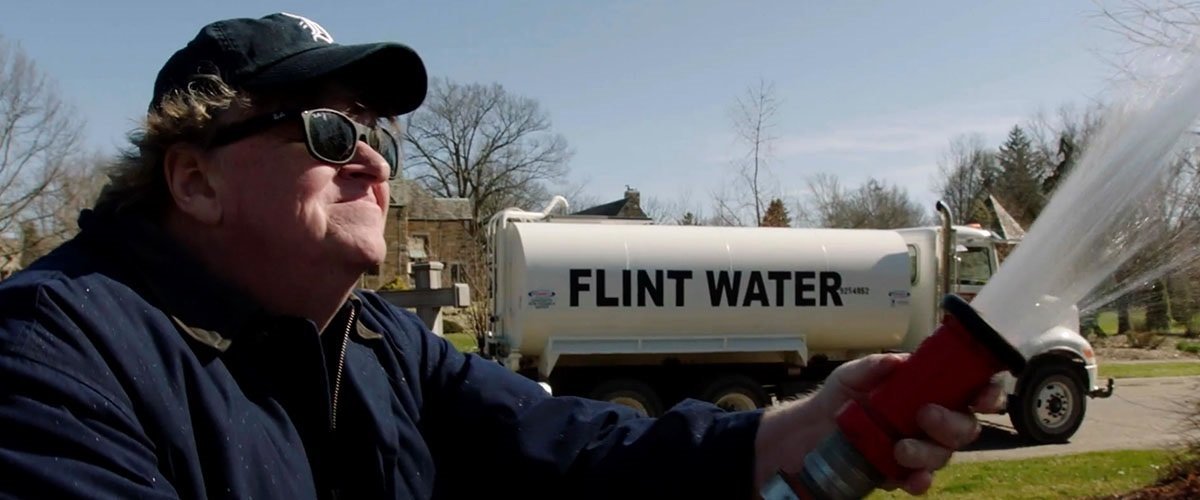
Directed by: Michael Moore
Starring: Michael Moore
"How the fuck did this happen?" This is Michael Moore's primary question two years removed from a Donald Trump presidential election win which few saw coming...although Moore himself famously predicted a Trump win following the 2016 Republican National Convention. Moore said he made the prediction in order to stir complacent voters who thought a Hillary Clinton win was in the bag. It wasn't. The reasons are myriad, including a complacent Clinton campaign in which she barely visited or did not normally blue states like Michigan or Wisconsin. Nor the area in between Pittsburgh and Philadelphia in Pennsylvania. Those three states went red that night, and although Clinton received three million more popular votes, Trump won the electoral college which ultimately determines the presidency.
Moore likens Trump's walk to the stage on election night as a "perp walk". He says of Trump's acceptance speech: "Never has anyone been so unhappy to win the presidency," I don't know how true that is, but Trump looks awfully dour. If you follow Moore's reasoning, Trump originally entered the race as a negotiation tactic to make himself the highest paid TV personality on NBC. After NBC fired Trump for racist comments made about Mexicans during the initial stages of the campaign, Trump figured what the hell and made a real go of the campaign. Moore rails against the electoral college, which was founded to appease slave states during the writing of the Constitution, and against the media for its inordinate amount of coverage of Trump during the campaign trail. The networks loved Trump and put his kisser on screen any time it could. In one instance, CNN kept its cameras on an empty podium during a campaign rally in which Trump was fashionably late by forty minutes.
Moore's anger is directed at Trump during the first twenty minutes of Fahrenheit 11/9, but then examines a broken political system which has fostered apathy among voters. In Moore's home state of Michigan, 10,000 eligible voters didn't vote, and Trump won the state by 8,000 votes. If 10,000 more people voted, maybe Michigan would've remained blue. But, after everyone's handling of the Flint, Michigan water crisis, maybe not. Moore also studies this years-long issue as if he were covering a crime scene, and it is hard to argue against that belief. Thousands of Michiganders are sick or dead from drinking the contaminated Flint drinking water, and the problem is still ongoing. Then-President Obama's 2016 visit did not help matters, as he inexplicably drank the water in front of the press and a stunned crowd of supporters, which lent credence to Gov. Snyder's lies of the water being safe.
Moore covers a lot of ground in Fahrenheit 11/9, and sometimes the lack of focus hurts the overall narrative. Moore conducts more of his famous stunts, including delivering a truckload of Flint water to Gov. Snyder's mansion, and dubbing Trump's voice over a Hitler speech to a Nazi rally. Moore's comparisons of Trump's rise to Nazism are compelling, but the dubbing is overkill. We also see Moore's interviews with the Parkland shooting survivors and newcomer Democrats who won surprising primary victories in recent Republican strongholds, which offers a ray of hope to Moore as he fights against the lethargy and infighting within the Democratic Party.
Fahrenheit 9/11 was Moore's 2004 film which skewered then-President George W. Bush's administration. Fahrenheit 11/9 documents one with an even more dangerous trajectory, if you can fathom that. The saddest and inescapable part of the Trump presidency is the same as the rise of Nazism in 1930's Germany. If people were not behind it, and if enough people didn't believe the lies which were fed to them daily, then such rises to power would not have occurred. If you want to compare Trump to Hitler, that is one argument which can be made. But, Moore unflinchingly compares Trump's followers to Hitler's, which makes this an even more frightening proposition.
Moore is able to have his initial question answered in a sometimes humorous and sometimes tragic way. He seems to be more of a doomsayer in Fahrenheit 11/9 than his previous films, mostly because he is uncertain whether the political landscape will change enough to get rid of Trumpism. But, he remains tireless in his fight to urge people to vote and not sit on the sidelines. We can't hope for a savior like Robert Mueller or impeachment. We must take action, as many did in Moore's film, but the question remains: Will enough people do so?






